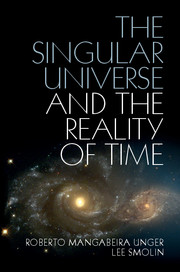Book contents
- Frontmatter
- Contents
- The nature and scope of this work
- Part I Roberto Mangabeira Unger
- Part II Lee Smolin
- 1 Cosmology in crisis
- 2 Principles for a cosmological theory
- 3 The setting: the puzzles of contemporary cosmology
- 4 Hypotheses for a new cosmology
- 5 Mathematics
- 6 Approaches to solving the meta-law dilemma
- 7 Implications of temporal naturalism for the philosophy of mind
- 8 An agenda for science
- 9 Concluding remarks
- Acknowledgments
- References
- A note concerning disagreements between our views
- Index
8 - An agenda for science
Published online by Cambridge University Press: 05 December 2014
- Frontmatter
- Contents
- The nature and scope of this work
- Part I Roberto Mangabeira Unger
- Part II Lee Smolin
- 1 Cosmology in crisis
- 2 Principles for a cosmological theory
- 3 The setting: the puzzles of contemporary cosmology
- 4 Hypotheses for a new cosmology
- 5 Mathematics
- 6 Approaches to solving the meta-law dilemma
- 7 Implications of temporal naturalism for the philosophy of mind
- 8 An agenda for science
- 9 Concluding remarks
- Acknowledgments
- References
- A note concerning disagreements between our views
- Index
Summary
The main test of the ideas we have argued for, as of any new scientific ideas, is whether they generate a new agenda for research in science that succeeds in generating new knowledge even as it instigates a new paradigm for the organization of our ideas about nature. In this last chapter of this book I show that it is already doing so. The main fields affected are cosmology, quantum gravity, and the foundations of quantum theory.
The agenda for observational cosmology
The first field affected by our program is cosmology, where indeed there already is a split between those investigating pluralistic models of cosmology and those developing models based on a succession of universes. We have said enough about the failure of many-universe cosmologies to generate falsifiable predictions (but for those readers needing more convincing of this, see [7, 10, 9]) and need only contrast this with the genuine predictions generated by cosmological scenarios which assume the big bang is not the first moment of time, but a passage before which the universe existed, if possibly under different laws. Three examples, discussed above, suffice to demonstrate the claim that such successional hypotheses can and do generate falsifiable predictions for doable experiments.
The cyclic cosmologies of Steinhardt, Turok, and collaborators make two predictions for the structure of the fluctuations in the CMB which strongly distinguish them from predictions of generic inflation models [56]. (The qualifier “generic” is necessary because inflation models can be fine-tuned to generate diverse predictions.) These are an absence of tensor modes and a significant non-Gaussianity. Both predictions are being tested in data from the Planck satellite which is being analyzed as of this writing.
- Type
- Chapter
- Information
- The Singular Universe and the Reality of TimeA Proposal in Natural Philosophy, pp. 484 - 499Publisher: Cambridge University PressPrint publication year: 2014

